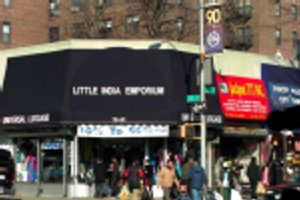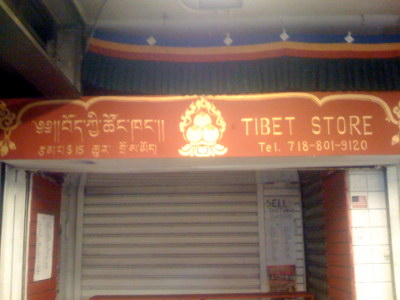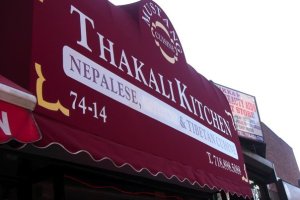From The Peopling of New York City
Contents |
What is an Ethnic Economy?
An ethnic economy is a specialized social system of production, distribution, exchange and consumption of goods and services which revolves around a particular ethnicity or range of ethnicities. It consists of the ethnic-self employed who hire co-ethnic employees. An ethnic economy caters to the needs of the specific group of people who comprise this social system and this is reflected through the businesses, services and merchandise that are present in the area. Although the constituents of an ethnic economy generally buy and sell merchandise which reflects their culture and lifestyle, it is often common for an ethnic economy to expand to the general population as well, a method successfully employed to increase both the customer base and profits. The majority of the merchandise sold revolves around the particular ethnicity represented in the area with an emphasis on food, clothing, jewelery and entertainment.
This business system is unique in the sense that it not only sells goods directed at a specific range of people, thereby directly benefiting these individuals who are able to obtain traditional goods fairly easily but is also somewhat of a haven for immigrants who are new to the country and attempting to begin a new life. In an ethnic economy, business owners prefer hiring family and co-ethnics. They will often provide job training, mentoring, financial foundation and assistance in eventual self-employment to employees, who often have just arrived in the country. The social benefits of this employer-employee relationship include a sense of belonging, a common language and shared values and customs which are the basis behind mutually beneficial relationships in the common ethnicity. These extrinsic and intrinsic benefits are often repaid not only through temporary employment but also, unfortunately, through economic exploitation. Immigrant workers are often exploited through poor working conditions, low-wages and social blackmail among other things. Although there are quite a few negative aspects behind the ethnic economy for immigrant workers, the system still offers a socioeconomic mobility structure for immigrants, and provides an opportunity for economic security unavailable in the non-ethnic economy.
Jackson Heights: South Asian Ethnic Enclave

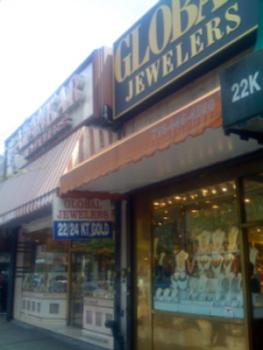
Although Jackson Heights is a cultural haven for individuals of South Asian descent, it is still primarily a business district and the lifestyle in this area revolves around the numerous businesses that have aggregated on this main two to three block radius. The area was established to create an ethnic economy, which revolved around the South Asian sub-continent and has expanded to include countries outside of Indian and Pakistan, such as Bangladesh, Nepal and Tibet. In recent years, Jackson Heights has seen a steep increase in the Bangladeshi population, so much so, that some store owners feel that it is becoming the majority in the neighborhood, if it has not done so already. It is also home to four major religions: Hinduism, Buddhism, Islam and Christianity. The appearance of both South Asian culture and religions is evident from the grocery stores to the jewelry shops, with the sale of produce and spices commonly found in South Asian dishes and the placement of religious ornaments in window shops.
Jackson Heights qualifies as an ethnic economy because it caters to the need of a specific ethnic group, South Asians, and displays many of the common facets found in an ethnic economy. The distribution, exchange and consumption of goods in this business district are primarily those found in the South Asian culture. For example, the largest supermarket in the area, Patel Brothers, provides a wide variety of produce, meats and spices that are commonly found in the South Asian culture. It still, however, sells merchandise that is not primarily “South Asian” and in this way branches out to individuals of non-South Asian descent while also providing its main customer base with commodities they might not usually incorporate into their lifestyle. The emphasis on South Asian goods can be seen in other stores such as Alankar Jewelers, Jackson Tailors and Raja Music House. Alankar Jewelers is an elaborately constructed shop, whose structure and interior display the wealth and prominence of this store. Although jewelry shops can be found in any business district, the large number of such shops in this area delineate the importance of gold and silver in the South Asian culture. Jewelry is not just decoration for the body, but is representative of social stature. In the South Asian culture, the extravagant display of jewelry on an individual lets others know exactly how wealthy that individual may be, and thus proves its importance in the social setting. It is also a vital aspect in marriage; jewelry is often given as the dowry in many South Asian weddings, and it is customary for the bride to receive jewelry from both the bride and groom’s side of the family. Jackson Tailors is a well-known shop throughout the neighborhood, and the workers are skilled at modifying traditional South Asian garments. These garments can easily be obtained from many of the clothing shops in the area, which sell both casual apparel and festooned garments usually reserved for a wedding. The placement of the dazzling wedding clothing up-front in the window shops attracts non-South Asian customers who do not know that this clothing is typically worn to a wedding and are attracted to the luxurious designs. Store owners are aware of this fact and use to this their advantage to sell wedding attire when it would not be commonly bought for everyday occasions. The entertainment shops in the area are usually blasting the latest overseas hits, from Bollywood movies to Bhangra dance music. This method not only attracts customers who are aware of the latest music and movie trends, but also those who are unaware of this type of music and first heard it while walking through the neighborhood. The music and movie industries are massive in South Asia, particularly India, and the prevalence of the numerous shops dedicated to this field depict the importance of these facets in South Asian lifestyle.
Walking through Jackson Heights and entering many shops, one cannot help but notice that the majority of all stores are run by South Asians and the employees are South Asian as well. This correlates with another significant aspect of an ethnic economy- the ethnic-self employed who hire co-ethnic employees. Many South Asian store owners will hire employees based on their race and the cultural capital they bring to the job. This includes the ability to speak either Hindi or Bengali, the knowledge of the culture and an awareness of the latest overseas trends. Store owners admit to being biased in their hiring process; many will hire South Asians only because their business will benefit the most if they employ individuals who share a common bond with the dominant customer base, and thus create a general feeling of comfort in the store’s atmosphere. In an interview with the owner of Alankar Jewelers, Interview with Owner of Alankar Jewelers , I was informed that the color of an individual’s skin followed by the language they speak are they two most important criteria for hiring a potential employee. They do not need to speak several languages, but they all should at least speak Bengali or Hindi. If they don’t know Bengali, they will have to learn if they want to work in most stores in this area. Being able to speak Hindi is also important, but they will be able to work if they do not know it. The same is true for other South Asian languages and dialects. In an interview with the owner of Khera Travels, Interview with Owner of Khera Travels, a dual-business which includes a travel agency adjacent to a clothing shop, the owner of the clothing shop informed me that race and skin color are important factors, as well as knowledge of the latest fashion trends. In his hiring process, he seeks individuals, usually girls, who are aware of what is currently fashionable and can then disperse that information among the uninformed constituents of Jackson Heights.
It is now evident that Jackson Heights qualifies as an ethnic economy because it is a social system that distributes and exchanges products amongst a particular ethnic group, while simultaneously providing an enclave for that group to reside in as well. It utilizes the practice of co-ethnic hiring and allows newly arrived immigrants to acquire a job and residence. The hiring process is biased because store owners prefer hiring individuals that represent the majority of the inhabitants of the neighborhood. This is not a personal bias, but a decision that is purely business related. Co-ethnics will be able to create a comfortable atmosphere for the ethnic shoppers, and are able to communicate effectively with customers and convey the knowledge they posses about the merchandise. This business district also branches out to American shoppers and tourists as well, with restaurants like Jackson Diner, whose impressive ratings in the Zagat Survey have bolstered its reputation. This area not only provides a growing cultural haven for South Asians but also provides an accurate representation of South Asian lifestyle and traditions, while primarily serving as a business district home to a wide array of stores.
Business and Services
There are many different businesses in Jackson Heights, from food to clothing to jewelry and more. Even so, the area is so condensed that often very similar stores can be found in close range of on another. In a shopping area of not even five full blocks, there are over one hundred different businesses clustered together. The breakdown of the businesses has been recorded as follows:
As can be seen by the chart, with all the businesses grouped together, there are many conflicts. Many different business owners are selling the same goods and services as their fellow business owners of the same area, and therefore it adds to competition in the area.
The most prevalent sub-group of the area are the services. This encompasses such services as driving schools, insurance companies, and travel agencies, as well as a few fashion salons, barbershops, and cell phone service stores. These are so prevalent because they are very easy to upstart. For many of these businesses, they can be seen on top of storefronts, making use of the extra space above businesses. Another reason a few extra have popped up is because many local business owners who are hungry for more business, or are desperate because of failing business, start up in conjunction with their primary business.
Also, it is very popular to see professional businesses, such as lawyers and doctors. This is often the main focus for young South Asian Americans. Many times those who immigrate from South Asia come here already licensed professionals in their home countries, and they come to America and attempt to recreate their successes. Beside that, many parents push their children to become professionals, so many second and third generation children are more likely to become professionals as well.
One other interesting point within the business breakdown is the surplus of jewelry stores. Being young today I do not think people are used to seeing multiple jewelry shops near each other, at least no in most neighborhoods. However of all the businesses seen in Jackson Heights, jewelry may be one of the few we are used to seeing outside of ethnic communities. In New York City, there used to be a large Jewelry District (or Diamond District) around 47th street in Manhattan. It is not as large as it once was, but remnants of the district can still be seen. Also, in Los Angeles there is currently a very large area dense with jewelry shops. Between these two specific areas, and many more smaller scale versions throughout the states, there is certainly precedent for the cluster of jewelry shops. Also, these jewelry shops tend to the needs of different customer bases. Each shop owner sell jewelry specific for his own country or region or religion. For every small difference in culture or regional difference, they look for something different in their jewelry. Because of this, while many other businesses are in stiff competition with each other, jewelry shops are not always pitted directly against each other, at least not all of them.
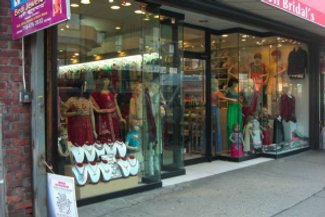
As far as entertainment and clothes and restaurant businesses are concerned, in terms of numbers, they are not as overly crowded together as some of the other businesses. They are certainly no more crowded than you would expect to see at the average American mall or shopping center. However the last point of interest within this ethnic shopping community is the lack of large chain stores. These stores make up only approximately 4% of the entire Jackson Heights community. On any 5 block stretch of Lower East Side Manhattan you will find two or three Duane Reades, a few fast food chains, and most likely a Starbuck's or Pinkberry. This might not even be all of it, and it does not even include banks. But these largely successful "can't miss" chain stores have not been able to infiltrate this ethnic community. Very few of these stores are there. I am unsure of whether it is difficult them to acquire the place to rent, or if they do not think it is worth it, but what i do know is that the less chain stores that are located there, the more room there is for local businessmen to open shop, and the less they have to compete with.
Purpose of This Ethnic Economy
From a cultural standpoint, the ethnic economy is very beneficial. This is true because of a few main points. Firstly, there is a great cultural base. In an ethnic economy such as Jackson Heights, it is easy for businesses to stand together. New businesses have older businesses to seek help from, advice from one business owner to another. It is outstanding for support, as new businesses fail in the first year. In an ethnic community,they more likely to find help for the business to get through these rough starts.
Aside from support, it is very valuable to have such a reliable customer base. This is especially true for businesses that are more ethnically oriented. It is very possible for some of the professional businesses to succeed in any area, because their services are always needed. However for someone opening a business selling religious idols or traditional clothing would have trouble selling goods in a different community. In Jackson Heights, there is already a strong customer base. If a store owner is selling religious idols or traditional clothing in this sort of shopping area, it is possible for any customer to walk in and purchase goods, which is how business reputation gets rolling. Without this customer base, financially it would be difficult for an ethnically specific store to survive.
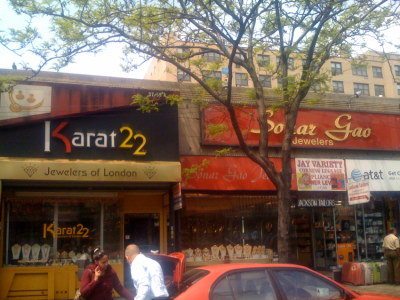
The purpose of an ethnic economy from the most broad way of looking at it is very simple. An ethnic economic community is a tool to ensure that a business is as prosperous as it can possibly be. Just like any other economy, the goal is prosperity. The feeling in this area is that as these businesses stay together, and they focus on maintaining a certain customer base, they can defy the odds that come with running a business. For many of these storeowners, this is the only place where their business has a real shot of surviving, and for others there is no reason for them to move to a different location. Not every business in the neighborhood has turned their owner filthy rich, but for most they are doing well enough, and are better than an alternative.
Success in an Ethnic Economy
Of all the different aspects of the shopping area of Jackson Heights, one that stands out is the business placement. The custom in America is building shopping centers with different businesses independent of each other, in order to maximize the amount of consumers for the area. This choice of location seems to be the number one rule of American business, because it alleviates the difficulties of competition. However, in Jackson Heights, many businesses have opened up shop right next to or near another store that has products or services that are nearly identical. In America, this could be considered a crippling decision, and I am sure that many big business tycoons have statistics about the enormous probability of failure. However, in an ethnic neighborhood such as Jackson Heights, they are able to make it work. The question is how? How are they able to make it work so well? And what are the reasons for not branching out or eliminating their competition? Yet they are able to sustain success in this community that disregards American business philosophies.
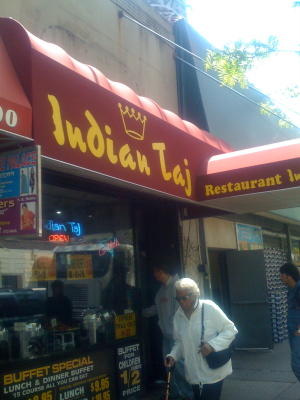
The answer is loyalty. This ethnic community is able to maintain success because of the loyalty of their customers. This is a common tool that ethnic communities employ, and Jackson Heights in particular relies on it for business. Customers who shop there have been shopping there for many years. They feel comfortable in the environment surrounded by people of similar cultures and language. They have familiarity with the area, and they know how to get from place to place and store to store. Because of this, people will travel substantial distances to come and shop there. It helps that it is the site of a major train station at 74th St. and Broadway, as people are able to access the shopping area easily by a number of trains. To people of those cultures, the shopping area is their mall. They can go there and purchase anything they want or need, they can have lunch, and they can meet friends, old and new. It doubles as a social gathering as well as the ethnic economy.
Competition is always a problem, and can often be crippling for one business. However what is forgotten is competition greatly benefits the consumer. This helps lead to the loyal customer base that really is the underlying factor of success of the entire community. Profits may not be as high due to low prices, but the loyalty of the customers makes up for these profit margins, and allow owners to stay in business with low prices.
In an interview with Jackson Heights Customers, one man suggested, or implied if you will, that maybe the "American business philosophy" is wrong. He said "The competition and location is not as important as treating your customers fairly and with respect. The stores I shop in I am loyal to because the stores have been loyal and respectful to me. No matter where a business is, respect is the most important thing." This is a great point and truly encapsulates the spirit of the ethnic economy. Just maybe in the midst of statistics and where to position items to make them more desirable and location, American business has lost something very important. That is personal interaction and relationships, and a feeling of friendliness in the institution.
This is how the ethnic economy of Jackson Heights has been able to survive all these years.
Dual Business Tactic
Throughout the ethnic business district that is Jackson Heights there is a unique business tactic not seen in many traditional American shopping areas. The dual-business, a prevalent feature of this neighborhood, is a practice that arises from the mutual agreement between two individuals who have decided to share a location and join their shops in hopes of increasing their customer base, and thus, their profits. This strategy not only increases the number of customers that enter each shop, but also allows numerous stores to open up in one area and allow the owners to save money on their payments for either renting or leasing the land. Walking through Jackson Heights, one cannot help but notice the stores that are seemingly “stacked” one on top of another. This is a direct result of the dual-business scheme, and directly affects the population density of each building. This method maximizes the number of stores and individuals who can operate in one location, and therefore is highly economical because it optimizes all of the resources that are available in the area. After interviewing a few store owners in this community, I came to realize that although this tactic is highly unorthodox in the "American business scheme", it suits the Jackson Heights business district quite well because of the chemistry between the shop owners and allows these individuals to increase their profits. When the shops are first created, it is common for the owners not to know each other but to develop a good friendship over time because of the juxtaposition of their stores. This friendship will lead to a good business relationship; shop owners will refer customers to the business located next door or upstairs, if there is a strong relationship, and hope that their deed will be reciprocated in the same manner on a later date. In my interview with the owner of the Jay Variety Shop located on 74th Street and 37th Road, Interview with Owner of Jay Variety Shop, I was informed of the friendship that had developed between the owner of this shop and the owner of Jackson Tailors. Because of the relationship that had begun over 22 years ago, these two individuals have created a great business chemistry and used this to their advantage. The customers of the tailor shop will often step into the variety shop on their way to the tailor and often pick up a few items. In return, the owner of the variety shop recommends Jackson Tailors to customers who are looking for a reliable tailor. Because these two individuals are self-less in their pursuit of small business growth, they are able to maintain a successful business while helping the other. They also save money on the their rental payments, and have also increased their profits by sharing customers. Because of the great success he has obtained, the owner of the Variety Shop recommended the dual-business tactic to any new entrepreneur in Jackson Heights.
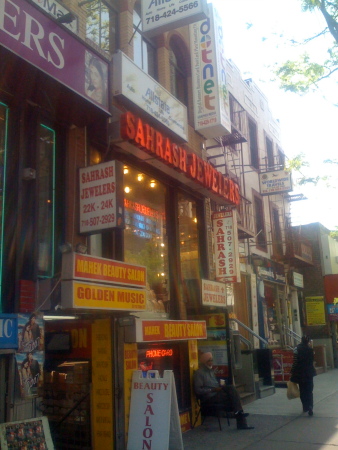
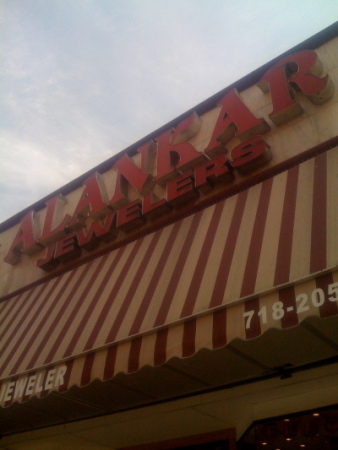
This page was done by Suleman Ilyas and Rob Dire.

